Happy Earth Day! There are so many ways to celebrate Earth Day and today will focus on how we can Save The Ocean. We know that it will be up to governments to make and ENFORCE laws, up to companies to incorporate a circular economy with their packaging and products and ultimately the end user (consumer) to care about where they live and the environment. That will be the hardest of all.. getting the consumer to change their disposable lifestyle habits.
80% percent of marine pollution comes from land. From coral bleaching to plastic to sea level rise the entire marine eco-systems is changing rapidly and each person can do something about it.
Cities, Counties, States and Countries have started the first step to eliminate plastic pollution. But what if all of the below laws became global?
Ban Styrofoam at Beaches/ Shorelines: This includes disposable styrofoam coolers, styrofoam cups and take out containers and disposable boogie boards. San Diego banned Styrofoam effective May 24, now the California Restaurant Association is suing San Diego to prevent this law. San Diego, the largest city to do this was going to ban the use and distribution of egg cartons, food containers, coolers, ice chests, pool or beach toys, mooring buoys and navigation markers made fully or partially of polystyrene foam.
My styrofoam count is over 22,000 pieces of small styrofoam pieces and that doesn’t count the boogie boards, the pool noodles, egg cartons (yes), buoys, ice chests and other assorted styrofoam packaging. In Baltimore their Mr. Trash Wheel, a floating device that picks up waste from the harbor, is reported to collect an average of 14,000 Styrofoam containers a month. 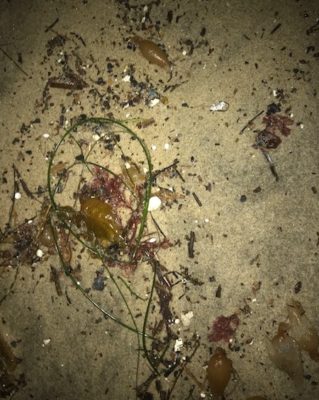
Ban Single Use Plastic Utensils that are not reusable. Europe is already starting this and other countries should follow suit. To date I have picked up over 3300 plastic spoons, forks and knives.
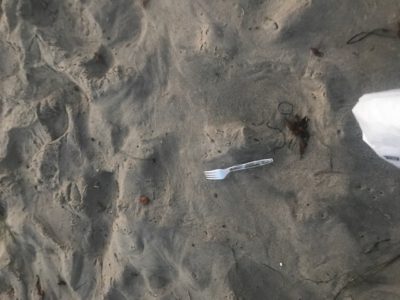
Ban Single Use Straws or use only compostable paper straws. The most distinctive straw is Starbuck’s green and thick straw. straws-upon-request” . To date have picked up over 5340 plastic straws. Many of those straws (see below) are not even used.
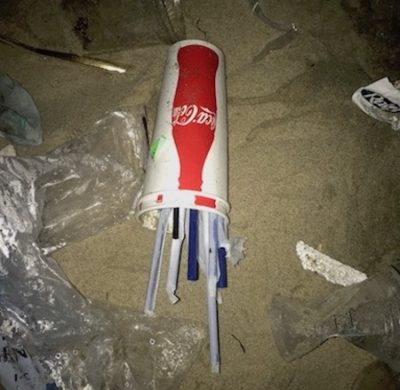
Ban Microfibers– Studies have shown that 25% of fish and 33% of shellfish have microfibers. This might be impossible, but it makes sense. A California Bill # AB 2379 would have required clothing with more than 50% synthetic material to include a label that states the item will shed plastic microfibers when washed. That would have been a good thing because it would make the consumer aware of the material.
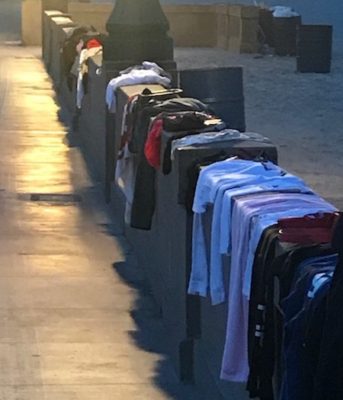
Ban Single Use Plastic Bottles without attachable cap. This was on our California Ballot last years. Unfortunately it did not pass. Crystal Geyser was already doing this.. good for them. The result would have eliminated thousands of bottle caps on the beach. To date: I picked up over 7400 bottle caps. In 2016 10,004 bottle caps were collected from the Dutch North Sea coastline during the 2016 Boskalis Beach Cleanup Tour, 822,227 Bottle caps were found in the 2017 Clean Up Day report.
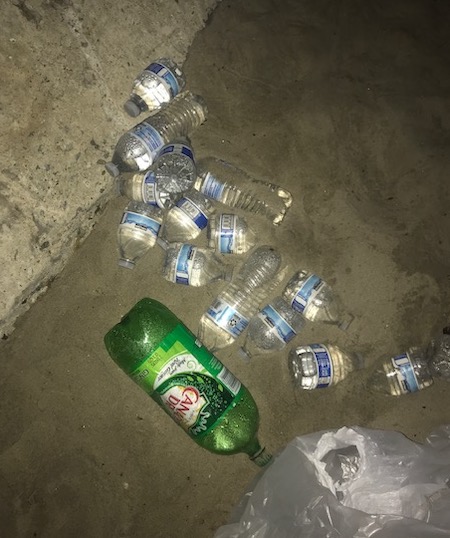
Ban non-recyclable Food containers; This would include all plastic and styrofoam plates and cups for take out. It would require all State Parks to have recycling bins. This is not true in San Diego. The Trash Cans on the beach and in the parks do not have recycling bins. I should say they do, but they are hidden away and cannot be found.
Ban Vaping- Smoking on all beaches and state parks. This is already a law in San Diego, yet hundreds of cigarette butts, cigarettes, Vaping and other smoking trash litters not just the beaches. Cigarette Butts aren the #1 most littered item. CalTrans estimated it costs $41 million taxpayer dollars annually to clean up cigarette butts. 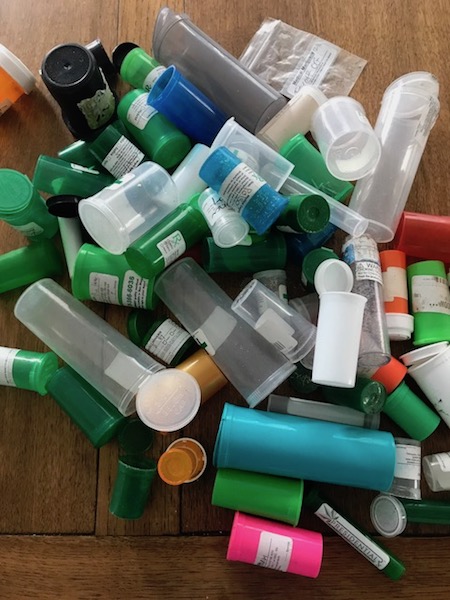
Ban Drinking on The Beach, or I should just say that enforce the No Drinking on the beach law. I do not know how it is anyplace else, but I do know this, drinkers are slobs.
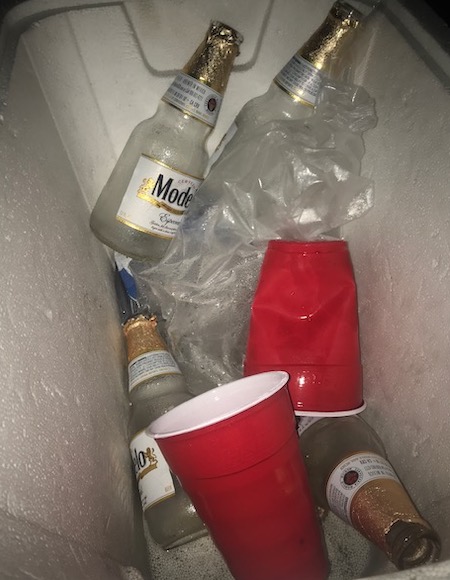
Eliminate non-Reef Friendly Sunscreen at beaches. Hawaii and other places have done and it would applicable everywhere.
Regulate Fishing: The population of Tuna and other large game fish have fallen to 90%. Set catch limits and go after the illegal fishing. Illegal fishing is a major threat to the sustainability of the world’s fisheries, accounting for up to 20 percent of all wild marine fish caught—up to $23.5 billion worth of seafood. (Pew Research) Reduce gill nets and trawling, as these kill thousands of secondary marine animals. Encourage fisherman to seek other ‘fishing opportunities’ such as fishing for energy.
Eliminate Off Shore Drilling: This is not going to happen any time in the near future But you can put a moratorium on any new drilling, and that includes the Arctic Ocean . There were 184 offshore rigs in the North Sea. The North Sea and the Gulf of Mexico (United States) are home to many offshore rigs, totaling 184 rigs and 175 rigs, respectively as of January 2018. But Trump wants to open the whole ocean up to offshore drilling despite protecting the eco-systems. (See New York Times)
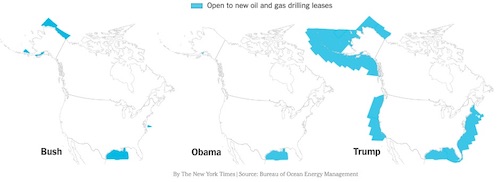
Control Noise Pollution: Sonic Booms and Sonar Exercises: The U.S. Navy’s uses high-intensity sonar-training exercises, the seismic exploration of offshore oil and gas drilling, and the daily noise commercial shipping interferes with marine animals communication and disrupts their eco-system and may kill them.
Set aside more Marine Sanctuaries and Parks. Currently NOAA manages thirteen national marine sanctuaries and co-manages two marine national monuments. We need more.
Off the Beach
Enforce strict regulations on factories and industrial plants discharge sewage.
Enforce strict regulations on air pollution as they are responsible for almost one-third of the toxic contaminants and nutrients that enter coastal areas and oceans.
Laws currently in place from our EPA
The Act to Prevent Pollution from Ships (APPS) (PDF) (21 pp, 218 K, About PDF)
The APPS (33 U.S.C. §§1905-1915) implements the provisions of Marpol 73/78, the International Convention for the Prevention of Pollution From Ships, 1973 as modified by the Protocol of 1978. (“Marpol” is short for marine pollution.) In 1987, APPS was amended by the Marine Plastic Pollution Research and Control Act. The MPPRCA requires EPA and National Oceanic and Atmospheric Administration (NOAA), to study the effects of improper disposal of plastics on the environment and methods to reduce or eliminate such adverse effects. MPPRCA also requires EPA, NOAA, and the U.S. Coast Guard (USCG) to evaluate the use of volunteer groups in monitoring floatable debris
Marine Debris Research, Prevention, and Reduction Act (MDRPRA) (PDF) (8 pp, 136K, About PDF)
The MDRPRA established programs within the National Oceanic and Atmospheric Administration (NOAA) and the United States Coast Guard (USCG) identify, determine sources of, assess, reduce, and prevent marine debris. MDRPRA also reactivates the Interagency Marine Debris Coordinating Committee, chaired by NOAA.
Shore Protection Act (SPA)
The SPA is applicable to transportation of municipal and commercial wastes in coastal waters. The SPA aims to minimize debris from being deposited into coastal waters from inadequate waste handling procedures by waste transporting vessels. EPA, in consultation with the Coast Guard, is responsible for developing regulations under the SPA.
The MPRSA, also called the Ocean Dumping Act, generally prohibits:
-
Transportation of material from the United States for the purpose of ocean dumping;
-
transportation of material from anywhere for the purpose of ocean dumping by U.S. agencies or U.S.-flagged vessels; and
-
dumping of material transported from outside the United States into the U.S. territorial sea.
The Act defines coastal recreation waters as the Great Lakes and marine coastal waters (including coastal estuaries) that states, territories, and tribes designate in their water quality standards for use for swimming, bathing, surfing, or similar water contact activities
Much More Could Be Done:
- Educate the Consumer via Art or signage on Plastic Pollution in all parks and beaches.
- Establish Clothing Bins for found clothing and shoes that can be re-donated back.
- Establish: Toys bins for toys left on the beach
- Create: Better Signage of laws and Regulations of beaches
- Enforce with Heavy Fines and volunteer activity. Make it worth the city-state-county to enforce the law.
- Encourage and fund innovations in ocean waste management.
There you have have it, if you look at the all the above, most of it can be effected daily by every person on this earth. It is up to us to change the patterns of behavior.
Happy Earth Day.
Resources
Surfrider: Eco Friendly Restaurants
